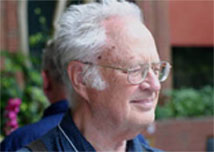 Barry Clark (Photo courtesy of Barry Clark)
Barry Clark (Photo courtesy of Barry Clark)
Barry Clark
Article contributed by Kenneth I. Kellermann
The 2009 Grote Reber Gold Medal for lifetime innovative contributions to radio astronomy has been awarded to Dr. Barry Clark, who is an Emeritus Scientist at the U.S. National Radio Astronomy Observatory (NRAO) in Socorro, New Mexico. Clark is being honored for his many pioneering developments to radio interferometry and synthesis imaging, over a career spanning more than half a century.
Barry Clark received his BS and PhD degrees in astronomy from Caltech in 1959 and 1964 respectively. His scientific career has extended over a full half a century starting with his research on the solar corona and the Galactic magnetic field while still an undergraduate student at Caltech. As a graduate student, Clark used the Caltech radio interferometer to study Galactic atomic hydrogen clouds, and suggested that interstellar hydrogen is found in two distinct temperature phases - thus leading to our current understanding of the multiple phases of the interstellar medium.
After receiving his PhD in 1964 Barry went to NRAO where he has remained until the present. Soon after he arrived at NRAO, he led the development of the world's first digital recording, software correlator Very Long Baseline Interferometer system and the subsequent enhancements to its sensitivity. He is probably best known, however, as the intellectual power behind the Very Large Array. Later, he led the design of the Very Long Baseline Array, an array of ten radio telescopes spread across the U.S. which provided unprecedented angular resolution.
The 2009 Reber Medal will be presented to Barry Clark on August 5 at the IAU meeting in Rio de Janeiro, Brazil during at a session of the Working Group on the history of Radio Astronomy. The Reber Medal was established by the Trustees of the Grote Reber Foundation to honor the achievements of Grote Reber and is administered by the Queen Victoria Museum in Launceston, Tasmania.
Modified on Wednesday, 03-May-2023 10:35:29 EDT by Ellen Bouton, Archivist (Questions or feedback)
|
![[IAU logo]](iau_wb_thumb.jpg)
![[URSI logo]](URSI-logo-thumb.jpg)
![[Karl Jansky at his antenna]](jansky_photo_02_thumb.jpg)
![[Reber's Wheaton antenna]](Reber_Telescope_Wheaton_thumb.jpg)
![[Dover Heights]](Dover_Heights_02_thumb.jpg)
![[4C telescope]](GB61-195_4C_telescope_thumb.jpg)
![[Ewen and horn antenna]](ewen_horn1s.jpg)
![[Dwingeloo, 1956]](Dwingeloo-1956-thumb.jpg)
![[Jocelyn Bell Burnell and Cambridge antenna used in pulsar discovery]](burnell2_thumb.jpg)
![[Lovell Telescope at Jodrell Bank]](site_1594_0001-500-334-20180316163019-thumb150.jpg)
![[Wilson, Penzias, and Bell Labs horn antenna]](wilson-penzias-horn_thumb.jpg)
![[6-m Millimeter Radio Telescope in Mitaka, Japan]](6m-thumb.jpg)

